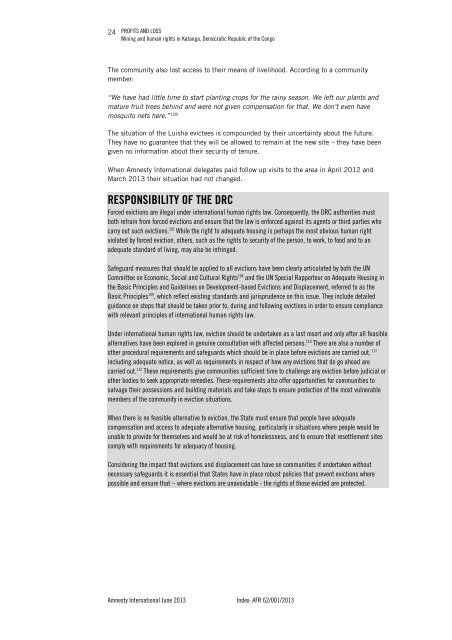Download - Amnesty International Canada
Download - Amnesty International Canada
Download - Amnesty International Canada
Create successful ePaper yourself
Turn your PDF publications into a flip-book with our unique Google optimized e-Paper software.
24<br />
PROFITS AND LOSS<br />
Mining and human rights in Katanga, Democratic Republic of the Congo<br />
The community also lost access to their means of livelihood. According to a community<br />
member:<br />
“We have had little time to start planting crops for the rainy season. We left our plants and<br />
mature fruit trees behind and were not given compensation for that. We don’t even have<br />
mosquito nets here.” 106<br />
The situation of the Luisha evictees is compounded by their uncertainty about the future.<br />
They have no guarantee that they will be allowed to remain at the new site – they have been<br />
given no information about their security of tenure.<br />
When <strong>Amnesty</strong> <strong>International</strong> delegates paid follow up visits to the area in April 2012 and<br />
March 2013 their situation had not changed.<br />
RESPONSIBILITY OF THE DRC<br />
Forced evictions are illegal under international human rights law. Consequently, the DRC authorities must<br />
both refrain from forced evictions and ensure that the law is enforced against its agents or third parties who<br />
carry out such evictions. 107 While the right to adequate housing is perhaps the most obvious human right<br />
violated by forced eviction, others, such as the rights to security of the person, to work, to food and to an<br />
adequate standard of living, may also be infringed.<br />
Safeguard measures that should be applied to all evictions have been clearly articulated by both the UN<br />
Committee on Economic, Social and Cultural Rights 108 and the UN Special Rapporteur on Adequate Housing in<br />
the Basic Principles and Guidelines on Development-based Evictions and Displacement, referred to as the<br />
Basic Principles 109 , which reflect existing standards and jurisprudence on this issue. They include detailed<br />
guidance on steps that should be taken prior to, during and following evictions in order to ensure compliance<br />
with relevant principles of international human rights law.<br />
Under international human rights law, eviction should be undertaken as a last resort and only after all feasible<br />
alternatives have been explored in genuine consultation with affected persons. 110 There are also a number of<br />
other procedural requirements and safeguards which should be in place before evictions are carried out, 111<br />
including adequate notice, as well as requirements in respect of how any evictions that do go ahead are<br />
carried out. 112 These requirements give communities sufficient time to challenge any eviction before judicial or<br />
other bodies to seek appropriate remedies. These requirements also offer opportunities for communities to<br />
salvage their possessions and building materials and take steps to ensure protection of the most vulnerable<br />
members of the community in eviction situations.<br />
When there is no feasible alternative to eviction, the State must ensure that people have adequate<br />
compensation and access to adequate alternative housing, particularly in situations where people would be<br />
unable to provide for themselves and would be at risk of homelessness, and to ensure that resettlement sites<br />
comply with requirements for adequacy of housing.<br />
Considering the impact that evictions and displacement can have on communities if undertaken without<br />
necessary safeguards it is essential that States have in place robust policies that prevent evictions where<br />
possible and ensure that – where evictions are unavoidable - the rights of those evicted are protected.<br />
<strong>Amnesty</strong> <strong>International</strong> June 2013 Index: AFR 62/001/2013


